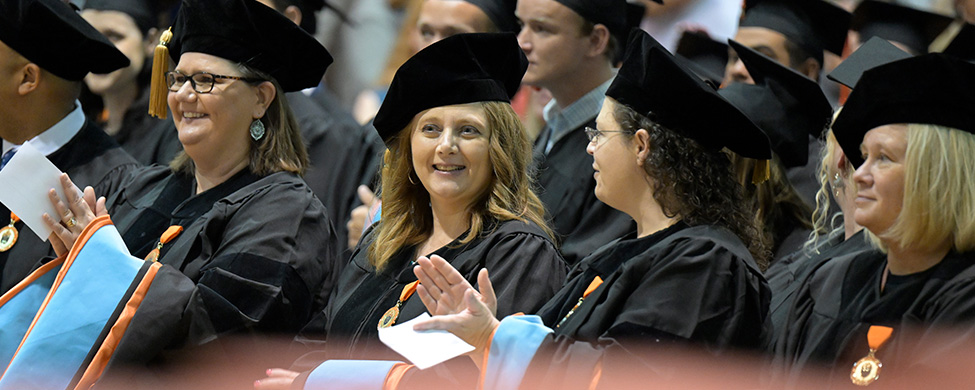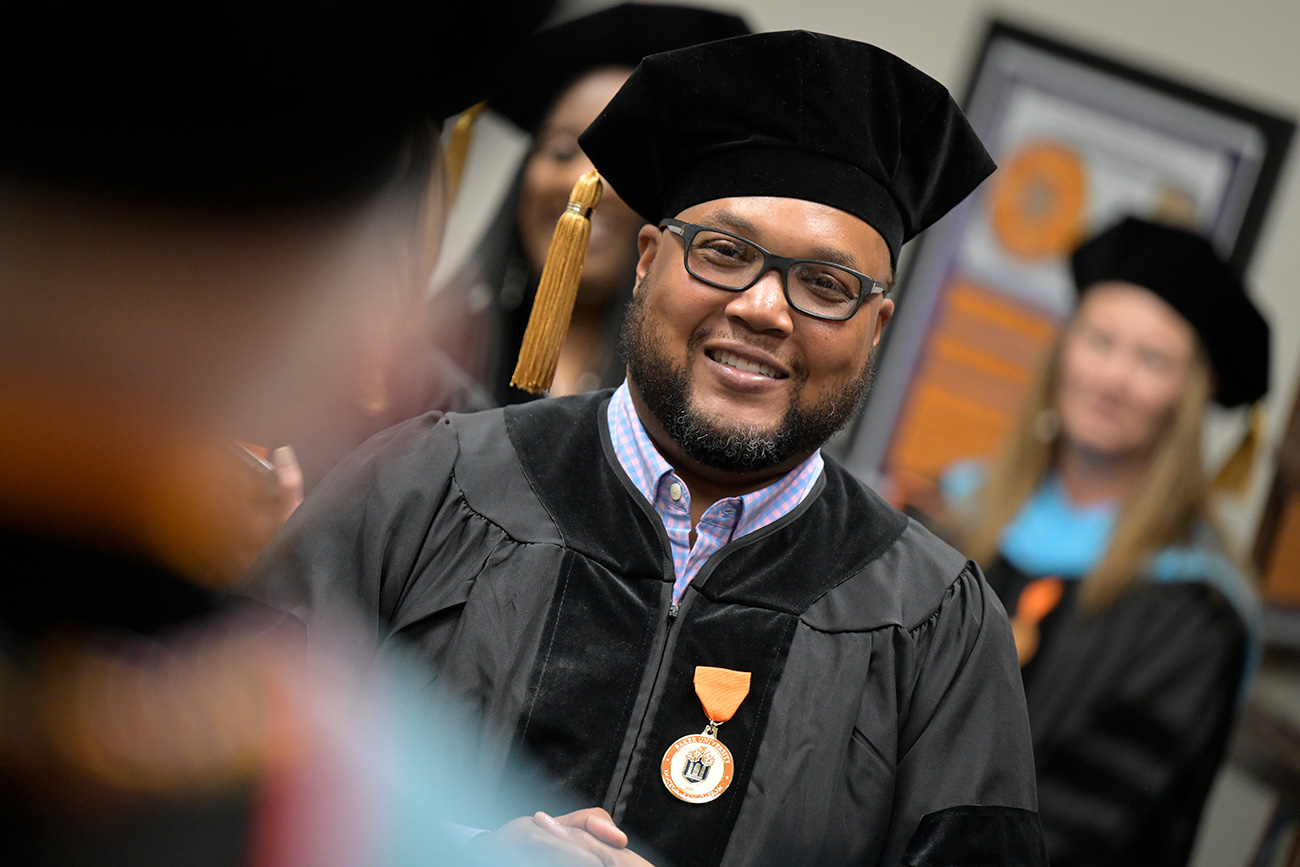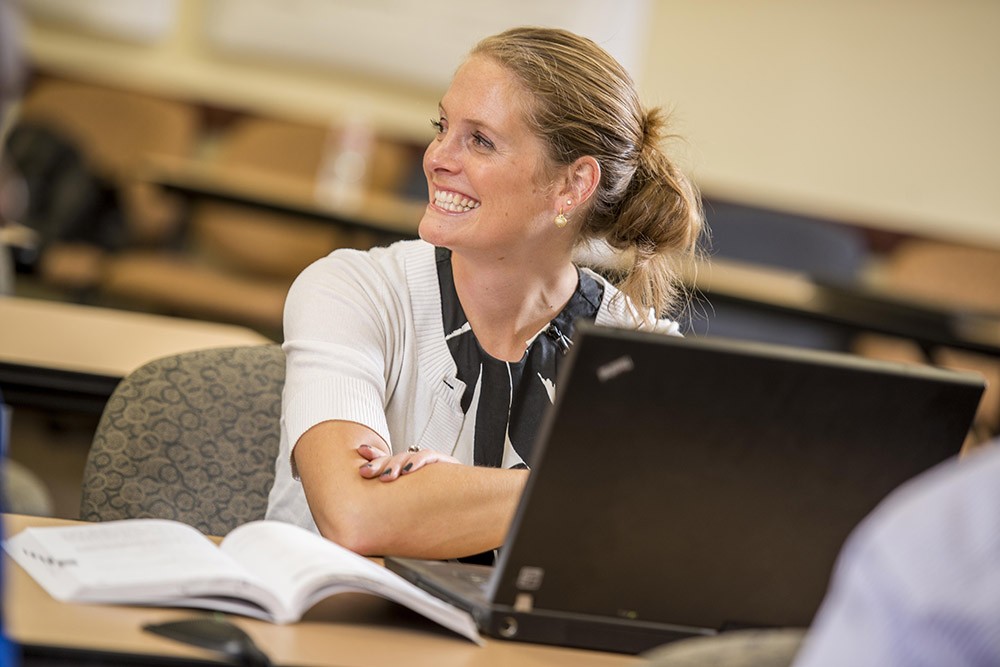DED 9000 Foundations of Educational Leadership 3 hours
This course provides a beginning foundation for the knowledge and performance areas needed for leading an educational community. Leadership issues addressed include the nature of leadership; leadership research, best practices, styles, cultures, and models; beliefs and values related to leadership; developing organizational goals, mission, and a strategic plan; the impact of leadership on the learning culture; communicating with diverse public and political entities; decision-making and critical thinking skills; responsibilities for financial, human, and material resources; community political, social, and economic issues; and ethical issues impacting leadership.
DED 9001 Communication and Collaboration in Leadership 3 hours
Candidates examine the philosophy, principles, practices, and agencies and organizations involved in or influencing school or organization community programs and initiatives. Special attention is focused on the role of leaders in planning and implementing system-wide communications and involvement networks. Candidates explore their creativity and expand their ability to lead complex teams effectively and to influence collaborative problem-solving processes as both a leader and a follower in the team process. This course will address the identification and utilization of community resources and the creation of family engagement partnerships, community linkages, and collaborative efforts to provide for the educational, cultural, health, lifelong learning, vocational, and out-of-school needs of students and citizens in a community. The term “community” will be defined for both P-12 and higher education. Candidates will be expected to address “community” according to their individual work settings and/or career aspirations.
DED 9002 Leading Special and Diverse Populations 3 hours
This course is designed to examine the role and responsibilities of leaders of diverse organizations, including the administrator, director, or supervisor of special education at the school district, state and federal levels, and leaders in organizations and agencies that serve and employ individuals with diverse skills, needs, and abilities. Participants become better skilled in leading programs through familiarity with state and federal statutory requirements, fiscal basis, organizational structures, relations to general school administration, and instructional and related services delivery systems. Current issues in educating students with special needs and preparing and employing individuals in today’s workforce are explored. Trends in the nation’s increasing cultural and ethnic diversity and the impact of these trends on organizations are examined.
DED 9003 Developing Professional Learning Communities 3 hours
This course examines professional development with the intent that candidates as future leaders in schools districts and organizations will be equipped to bring about improvements in student achievement through professional learning. Candidates engage in topics that include the development of professional learning communities through constructivist leadership and educational reform including the uses of technologies to bridge gender and racial gaps in traditional professional development initiatives. The course discusses the important issues related to the basic principles of professional behavior and ethics with respect to students, peers, administrators, and teachers from all environments. Strategies designed to increase an understanding of adult learning will be emphasized.
DED 9004 Curriculum, Learning, and Instruction 3 hours
This course addresses the supervisory process for curriculum and instruction at the district and organization level, including current research on teaching and issues in instructional supervision. The course provides candidates with leadership skills necessary to bring about a curriculum and instructional program that results in high levels of achievement by all students. Candidates focus on the alignment of district curriculum with state and national initiatives and regulations and on the processes needed to garner input and ownership of a district curriculum from a broad and diverse constituency.
DED 9005 Legal, Policy, and Ethical Issues in Leadership 3 hours
This course develops the candidate’s knowledge and performance skills in the areas of beliefs and attitudes, effective management, policy development, planning, organizational structure and performance, rights and confidentiality, and district or organization administrative legal issues that impact both human and physical resources, staff evaluations, ethical values, and integrity.
DED 9006 Human Resources Management 3 hours
This course is a study of human resources development practices at the system level, with emphasis on responsibilities for attracting, selecting, developing, evaluating, and retaining competent faculty, staff, and employees. The course provides a conceptual and technical background in the human resources function within the organization. Candidates have an opportunity to research and practice problem- solving and leadership skills as applied to human resources. Classes promote the sharing of professional expertise while avoiding problems associated with the sensitive nature of personnel issues. The guiding question of this course is “How can leaders employ, develop, and manage human resources effectively to improve student achievement and productivity?”
DED 9007 Management of Finances, Facilities, and Resources 3 hours
This course develops the knowledge and performance areas needed to manage district or organizational budgets, facilities, and material resources. Issues addressed by this course include working with boards of education, employees, and community members; aligning facilities and financial resources to the district’s or organization’s mission and goals; planning, developing, and overseeing budgets, facilities, and material resources; using technology to support effective management practices; understanding legal issues and ethical practices relating to fiscal matters; and communicating with and meeting the needs of all community populations, including special needs populations.
DED 9008 Program Planning and Evaluation 3 hours
This course is a study of the theory of program evaluation, techniques used in program evaluation, and the standards of quality for professional evaluation practice. The focus is on application of program evaluation processes in administering district and organization level programs. A candidate is expected to apply the principles and processes of evaluation in a study of a district or organization program.
DED 9010 Statistical Analysis 3 hours
This course addresses the application of descriptive and inferential statistical techniques for organizing research data and testing simple hypotheses. Candidates learn techniques for reporting statistical results including the generation of charts and graphs to describe data and to draw conclusions based on data. The course is practical in orientation.
DED 9011 Methods of Inquiry and Research 3 hours
This course is divided into two parts: qualitative and quantitative methods. The course presents basic research design. The qualitative paradigm is presented as complementary to quantitative methods rather than contradictory and competitive. Students begin developing ideas and researching topics for the Clinical Research Study.
DED 9900-1 Dissertation Development 2 hours
The doctoral dissertation is a research study that provides the candidate the means to demonstrate breadth of scholarship, depth of research, and ability to investigate problems independently and efficiently. The dissertation is an extended, coherent, and written work that demonstrates the candidate’s comprehensive knowledge and mastery of methodological, historical, topical, empirical, and theoretical issues relevant to the chosen research subject. The dissertation contains the results of extensive critical research of documentary source materials and field work. The first dissertation development course is completed when a draft of Chapter I is submitted to and approved by the candidate’s advisor.
DED 9900-2 Dissertation Development 2 hours
The second dissertation development course is completed when a draft of Chapter 3 is submitted to and approved by the candidate’s advisor.
DED 9900-3 Dissertation Development 2 hours
Candidates will submit a final draft of Chapters 1 and 3 of the dissertation as well as a draft of Chapter 2.
DED 9900-4 Dissertation Development 6 hours
Chapters 1 and 3 are reviewed and approved by the dissertation committee.
DED 9902 Dissertation Completion and Presentation *8+ hours
Chapters 1 through 5 are approved by the dissertation committee, the candidate successfully defends the dissertation, and all corrections are made. (*Continuous enrollment is required until completion.)
DED 9030/9031 Field Experiences I & II 2 hours each
Candidates plan and carry out two field experiences of a minimum of 60 hours each under the direct supervision and mentoring of an organization’s leadership. During one of the two directed field experiences, a minimum of 12 clock hours must be spent working in a diverse setting. The two field experiences may be within the same district or organization if with two different mentors. Field experience activities must be chosen from a listing of activities that coincide with program objectives and standards. These activities are expected to provide real-world opportunities to gain effective experiences.
DED 9032 Portfolio Presentation 2 hours
The electronic portfolio is considered the key assessment piece for the candidate. The portfolio exhibits the knowledge, dispositions, and performances gained in the program and serves as a major vehicle for the candidate to apply theory to practice. The portfolio is organized and aligned with the KSDE and ISLLC standards for district leadership. A candidate is required to achieve a minimum of “Proficient” on each of the portfolio areas prior to the completion of Field Experience II. The candidate uses a variety of technology tools and applications to enhance the portfolio and to present its contents before a committee of adjudicators. Defense of the portfolio is considered a major exhibit of the candidate’s abilities as a leader.
Total Program Credit Hours: 59+
Note: The university reserves the right to modify and resequence the core curriculum as necessary.







